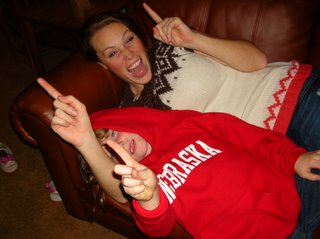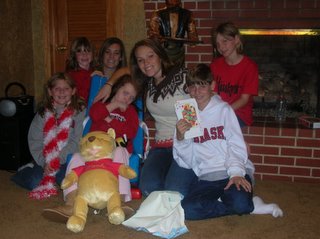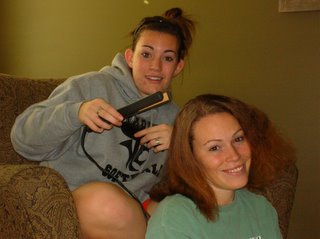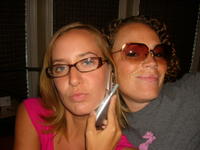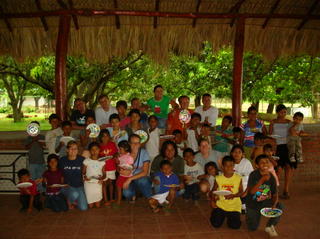
I like to be familiar with my surroundings, but growing up for me meant that every six months I got a new room, new school, and new friends. I didn’t really have a secure feeling until we moved to the blue house I lived in for seven years. I knew the noises in the middle of the night on the back porch were just cat fights. I knew all the best hiding spots; they were under the stairs. I knew the faster way to go down the stairs, by jumping off the banister (although mom didn’t like that way.) I liked adventure too.
When the opportunity came to go to an unfamiliar land for six months, it gave me mixed feelings. I was asked to go serve in a small community called Loma Linda. I was going to teach English and volunteer in orphanages. I wanted to make a difference in the world. In the beginning, it seemed so exciting and adventurous. I thought of all the new things I could do- meet exotic people, eat foreign food, learn a new language, and see incredible sights! But it all hit me the first month what I really was going to be subject to.
Being welcomed into the Nicaraguan home was not exactly what I expected. The first night I thought we would sit around and get to know each other a bit. I forgot a minor detail; we don’t speak the same language. In the living room, the television was on as an older looking man was sitting on the couch watching it. Two young girls are sitting on the chair by him, and kids are running around playing. Who are all these people, I thought. There I was, bringing out the dictionary, while they all stared and giggled. I tried to bring presents out, then to my surprise the strange man did know some English. “Oh, regalos for the poor blacks,” he said with a smug glare on his face. The girls sitting on the chair laughed, while the rest smiled awkwardly at me. Regalos, meaning presents, was meant to be an ice breaker. It sure didn’t make the conversation get any better, and I most assuredly had a sense of how he felt of my being there.
The first night might have been a little shaky, but it got better. I had been there for a couple weeks and I had not yet met the grandpa, Don Alex. He lived half of the year in the United States and the other half in Nicaragua. He came in a taxi, walked right in through the gate with a million bags and things. He looked like one of those sugar daddies in Vegas as he tried to tip the taxi driver. The kids came out and carried his bags for him. He looked at me and greeted me. I was expecting a polite, normal Nicaraguan greeting, you know, like a “Hola”. But instead I got, “Who are you?” “You weigh too much.” He, out of all the nine people in my house, knew English very well. Great, I thought, just great.

Since I didn’t know Spanish, I didn’t have a car, and I didn’t know the bus system, I was literally stuck in the house. This might have not been so bad, since it was 105 degrees outside, except that there is no air conditioning inside either. Ana Gladys, my house mother, was too busy working at first to show me how to take the bus. She told me stories of foreigners being mugged, robbed, held at gun point, and she tried to convince me that I should not leave the house. “Every time you go out, there are gangs waiting to steal your purse; there was a mugging this week just two blocks away.” This was going to be difficult since I came to work in orphanages and I had other meetings to attend. After about one month, she finally started to allow me to leave the house.
Ana Gladys first taught me the bus system. Easy enough, I thought, just get on the bus and go to your destination. That was what I thought before I actually saw the bus. The buses in Nicaragua are mostly donated from the states. Have you ever seen a picture of a bus from the 1950s? The buses in Nicaragua look exactly like that, with holes in the floors, a big flashy, sparkly sign in the front window that says, “God guides me.” When you add about two hundred people inside it, and you start to go down a hill at 70mph, trusting that the sign on the front window is true, then you know you are truly in Nicaragua.
There are many things growing up that you are taught never to do. You never ride in the back of a moving truck. You never eat food that is not inspected by the health department. You never jump off of a moving vehicle. You never litter. You never eat hot soup when it is 115 degrees outside. All these “I never” situations I thought the whole world knew about. I came to find out that in Nicaragua these are “I daily” statements. Any sense of familiarity here was out of the picture. Absolutely everything was the complete opposite of what I was used to.

At one point I thought I couldn’t take it anymore. It could have been the hot soup in the hot weather or the fact that after 2 months I still couldn’t speak Spanish, but what ever it was I wanted to give up and go home. I felt like I was not making any difference in the lives of these people. I didn’t feel I knew what I was doing or where I was going. I was sobbing. I was crying and I couldn’t explain why. The whole house got involved; they all sat around the table talking and trying to figure out what was wrong with me. They were asking questions and hugging me. I realized how much they cared about me. I had made an impact in some way or otherwise I wouldn’t have nine people around me trying to console me. It was then that I made a decision to stop comparing my opinion of what normal life should be like and start admiring their traditions. This changed everything.
I began to enjoy the loud and crazy bus rides. I made so many friends, and my Spanish improved, the locals no longer stared at me saying, “What?” Don Alex and I became the best of friends, he called me the daughter he never had. I learned about Nicaraguan history and all the terrible natural disasters that have happened there. I learned all the bus routes, even showed a few Americans around town. I started to look forward to riding in the back of pick up trucks. I began to walk the streets more and find my own secret ways through the markets and the neighborhoods. Until one day it was time to leave.
Walking the dusty, brown streets for what could be the last time, made me feel a sense of nostalgia. I had mixed feelings about leaving a place that was now so familiar to me. The loud, obnoxious honking of the horns from the buses, the hot soup, the people staring, the garbage in the streets, it was so different from what I grew up with but now was so expected. Almost like if it’s not loud, dirty and uncomfortable, I will feel out of place. Ana Gladys and I were walking to her father's house for the last time. “Where are you going?” she asked me, “it’s this way.” I smiled to her, “Follow me, I know a different way; it’s faster.”



